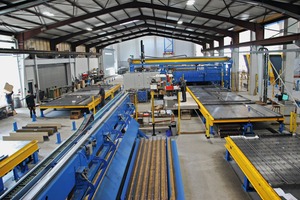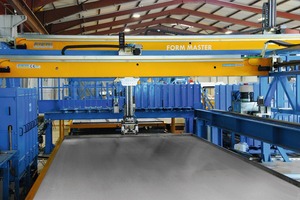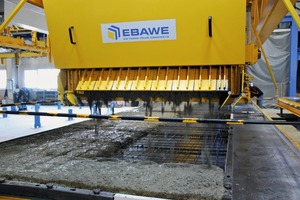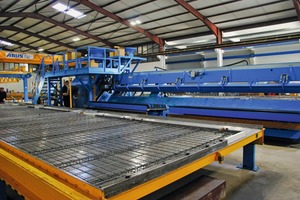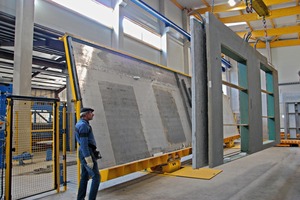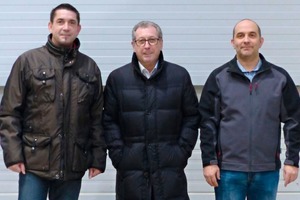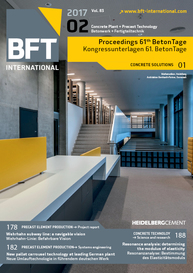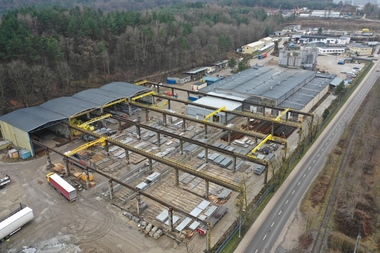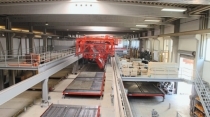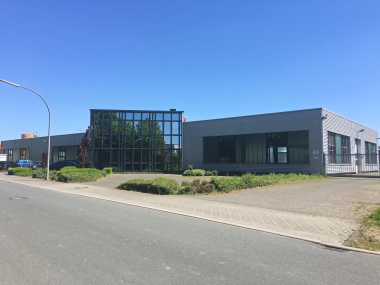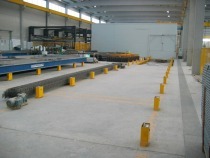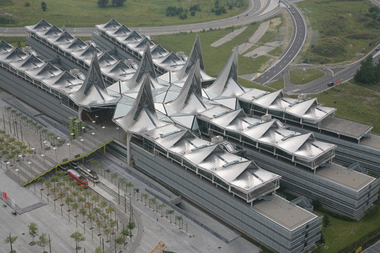Geared up for the future with new pallet carrousel technology
Forward thinking has always been part of the company philosophy cultivated at Albert Regenold GmbH based in the Mittelbaden town of Bühl-Vimbuch. It is no coincidence that, in the 1960s, the precast producer of long-standing tradition played a key role in the development of the double wall concept.
The company has created a solid base for the future with its recent decision to invest in state-of-the-art technology and build a new plant for the production of double walls, solid walls and precast slabs in the existing factory building. Prilhofer Consulting supported Regenold GmbH in this project as consultant, master planner and coordinator. Ebawe Anlagentechnik and Progress Maschinen & Automation, both members of the Progress Group, were put in charge of engineering and installing the plant.
Increased efficiency, optimized quality, automated production – these three catchwords are more relevant now than ever before also in the precast concrete industry. The objective is to manufacture products of consistently high quality at competitive prices and in accordance with the customer’s specifications. Modernization or even the new construction of production facilities is often a must in order to achieve this goal. Albert Regenold GmbH from Bühl-Vimbuch chose the second option and decided to build an entirely new plant for wall and slab production in an existing factory building. The new carrousel system and modernized reinforcement production unit were put into service a few months ago. Since that time, the company has already achieved many of the goals it had set for itself.
Increase in productivity and reduction
of operating costs
A modernization of the production facilities had long been under discussion at Regenold in recent years. “We had fairly modern production facilities already so that, in the beginning, our priority was on modernizing slab production,” explains Harald Sommer, owner and Managing Director. “We then decided in favor of a complete reconstruction, however, in order to be able to achieve our goals of facilitating operations, shortening distances and reducing energy expenditure.” The Baden-based family business, which looks back on a history of over 90 years, took this step after careful consideration. Productivity was to be increased, and operating costs were to be reduced. The solution was a carrousel system with a high level of automation and integrated reinforcement production for the manufacture of double walls, solid walls and precast slabs.
Consulting, master planning and overall design
by Prilhofer, technology by Progress
Prilhofer Consulting, active on a worldwide scale in providing consultancy and design services for the industrial production of precast concrete elements, developed the concept for the new production plant and, in a second step, drew up the invitation to tender for the suppliers of machines and plants involved in the process. Prilhofer Consulting also advised the precast producer in the selection of a suitable technology supplier. “With its extensive know-how, Prilhofer has given us great support and has been an important back-up for us in the selection and decision-making phase,” says Frank Frey, Technical Manager and Project Head.
“The challenge posed by this project was to integrate both the existing building and the existing mixing plant into the new concept. In addition to that, complying with the limited budget and ensuring a smooth transition of the existing plant into the new production facility were also quite demanding,” says Christian Prilhofer, CEO at Prilhofer Consulting.
Ebawe Anlagentechnik and Progress Maschinen & Automation, two member companies of the Progress Group, were eventually commissioned with building and installing the new plant. “Both manufacturers have advanced our layout in the right direction and convinced us with their approaches”, adds Managing Director Harald Sommer.
Extensive reconstruction measures
Reconstruction began as soon as the last precast concrete element had left the old production plant (line production) at the end of December, 2015. Two extensions were added to the factory building, and existing plants such as the heating and recycling plant were moved. Lattice girder production was moved as well so that it could continue to be used for the new carrousel system. The new plant was installed parallel to the expansion measures.
Since last summer, double walls, solid walls and precast slabs have been produced on a total of 50 pallets. Precast slabs account for 60 % and wall panels for 40 % of the overall production volume. “We are very satisfied with the results even now, just a few months after the start of production,” explains Technical Manager Frank Frey. The high level of automation has a very positive effect on the production process and product quality especially at two stations: shuttering / deshuttering of the pallets and discharge of the fresh concrete. “The technical solutions implemented at these stations – the Form Master shuttering and deshuttering robot, and the automated concrete spreader – are the highlights of the entire plant for me,” explains Frey.
Efficiency through fully automated processes
The shuttering and deshuttering process is completed in a fully automated operation. In a first step of the process, a warehouse robot retrieves the required shutters from their storage locations and transports them to the shuttering robot. They are then placed on the pallet surface in accordance with CAD specifications. After completion of the production process, a scanner detects the positions of the shutters, unlocks them and feeds them to the cleaning system. After that, the shutters are returned to their storage locations. “With the shuttering robot, we can be sure that the precast concrete elements are produced to pinpoint precision,” says Frey, expressing satisfaction. “In addition, the physical strain on our staff has been reduced to a minimum.”
The new, fully automated concrete spreader offers similar advantages according to Frey: “The greatest benefit is the high level of efficiency in discharging the fresh concrete.” Automation enables this step of the production process to also be completed without the need for manual intervention. “Prior to the reconstruction measure, experience always played a role in how well the concrete was discharged manually,” adds Frey. Misjudgments or human errors can now be prevented right in advance.
Modernized reinforcement production
and software
Part of the reinforcement is produced at the relevant stations, and part is transported to the stations and inserted into the pallets. A new straightening, cutting and bending machine of type MSR16 BK, developed and installed by Progress Maschinen & Automation, is used to produce the reinforcing bars. As the decoilers were positioned in an extension of the factory building, the wire is fed to the plant via double deflection. After straightening and cutting to length, the bars can be bent up by means of a wire end bending unit. They are then placed on the pallets in a manual operation. The lattice girders, which are produced in a different part of the building and transported to the station by means of a transport carriage and indoor crane, are also inserted manually.
The new software is an important component of the new plant. “For me, an effective process control system is one of the most vital criteria in a carrousel system,” says Frey. Regenold decided to install Ebos, the software solution offered by the Progress Group. Ebos goes beyond the concept of a simple master computer as it supports all aspects of the production process. Numerous features support both control and analysis of the different work steps. Regenold uses GPA (Graphical Performance Analyzer), for example, an analytical tool for the evaluation of production processes. This tool enables the entire process sequence to be played at a later date so that bottlenecks and opportunities for optimization become obvious at a single glance.
Regenold: sound footing for the future
Frey is convinced that it was the right decision to build the plant in this way and in collaboration with the Progress Group and Prilhofer Consulting. “For us as a company, the results are just perfect.” Managing Director Sommer sees Albert Regenold GmbH on a sound footing for the future. “I also have a very positive outlook on the future of the precast concrete industry,” he says. “It is not for nothing that we have been a member of different committees for a long time, working on designing this future.” As far as the company itself is concerned, this belief in the future was noticeable right from the outset: the precast concrete producer contributed to the development of the double wall concept, and the first double wall was produced at Regenold in the 1960s.

